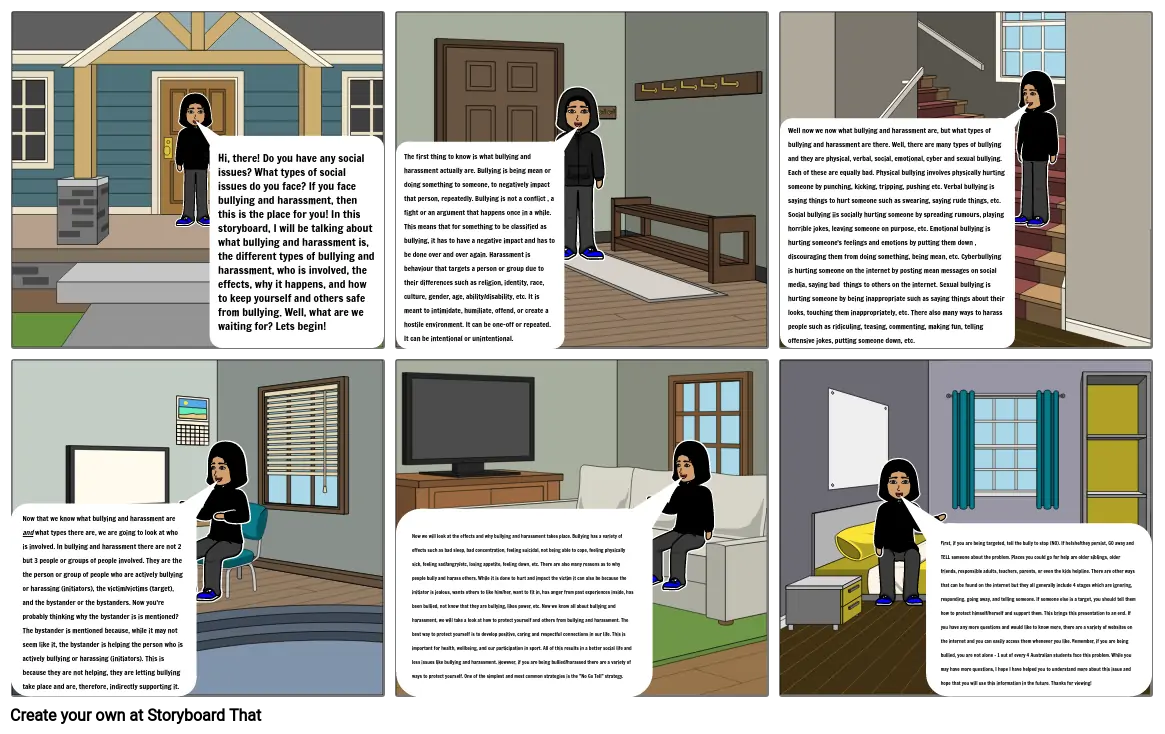Bullying, Harrassment and How to Stop It

Storyboard Tekst
- Hi, there! Do you have any social issues? What types of social issues do you face? If you face bullying and harassment, then this is the place for you! In this storyboard, I will be talking about what bullying and harassment is, the different types of bullying and harassment, who is involved, the effects, why it happens, and how to keep yourself and others safe from bullying. Well, what are we waiting for? Lets begin!
- The first thing to know is what bullying and harassment actually are. Bullying is being mean or doing something to someone, to negatively impact that person, repeatedly. Bullying is not a conflict , a fight or an argument that happens once in a while. This means that for something to be classified as bullying, it has to have a negative impact and has to be done over and over again. Harassment is behaviour that targets a person or group due to their differences such as religion, identity, race, culture, gender, age, ability/disability, etc. It is meant to intimidate, humiliate, offend, or create a hostile environment. It can be one-off or repeated. It can be intentional or unintentional.
- Well now we now what bullying and harassment are, but what types of bullying and harassment are there. Well, there are many types of bullying and they are physical, verbal, social, emotional, cyber and sexual bullying. Each of these are equally bad. Physical bullying involves physically hurting someone by punching, kicking, tripping, pushing etc. Verbal bullying is saying things to hurt someone such as swearing, saying rude things, etc. Social bullying iis socially hurting someone by spreading rumours, playing horrible jokes, leaving someone on purpose, etc. Emotional bullying is hurting someone's feelings and emotions by putting them down , discouraging them from doing something, being mean, etc. Cyberbullying is hurting someone on the internet by posting mean messages on social media, saying bad things to others on the internet. Sexual bullying is hurting someone by being inappropriate such as saying things about their looks, touching them inappropriately, etc. There also many ways to harass people such as ridiculing, teasing, commenting, making fun, telling offensive jokes, putting someone down, etc.
- Now that we know what bullying and harassment are and what types there are, we are going to look at who is involved. In bullying and harassment there are not 2 but 3 people or groups of people involved. They are the the person or group of people who are actively bullying or harassing (initiators), the victim/victims (target), and the bystander or the bystanders. Now you're probably thinking why the bystander is is mentioned? The bystander is mentioned because, while it may not seem like it, the bystander is helping the person who is actively bullying or harassing (initiators). This is because they are not helping, they are letting bullying take place and are, therefore, indirectly supporting it.
- Now we will look at the effects and why bullying and harassment takes place. Bullying has a variety of effects such as bad sleep, bad concentration, feeling suicidal, not being able to cope, feeling physically sick, feeling sad/angry/etc, losing appetite, feeling down, etc. There are also many reasons as to why people bully and harass others. While it is done to hurt and impact the victim it can also be because the initiator is jealous, wants others to like him/her, want to fit in, has anger from past experiences inside, has been bullied, not know that they are bullying, likes power, etc. Now we know all about bullying and harassment, we will take a look at how to protect yourself and others from bullying and harassment. The best way to protect yourself is to develop positive, caring and respectful connections in our life. This is important for health, wellbeing, and our participation in sport. All of this results in a better social life and less issues like bullying and harassment. However, if you are being bullied/harassed there are a variety of ways to protect yourself. One of the simplest and most common strategies is the "No Go Tell" strategy.
- First, if you are being targeted, tell the bully to stop (NO). If he/she/they persist, GO away and TELL someone about the problem. Places you could go for help are older siblings, older friends, responsible adults, teachers, parents, or even the kids helpline. There are other ways that can be found on the internet but they all generally include 4 stages which are ignoring, responding, going away, and telling someone. If someone else is a target, you should tell them how to protect himself/herself and support them. This brings this presentation to an end. If you have any more questions and would like to know more, there are a variety of websites on the internet and you can easily access them whenever you like. Remember, if you are being bullied, you are not alone - 1 out of every 4 Australian students face this problem. While you may have more questions, I hope I have helped you to understand more about this issue and hope that you will use this information in the future. Thanks for viewing!
Over 30 millioner storyboards opprettet

